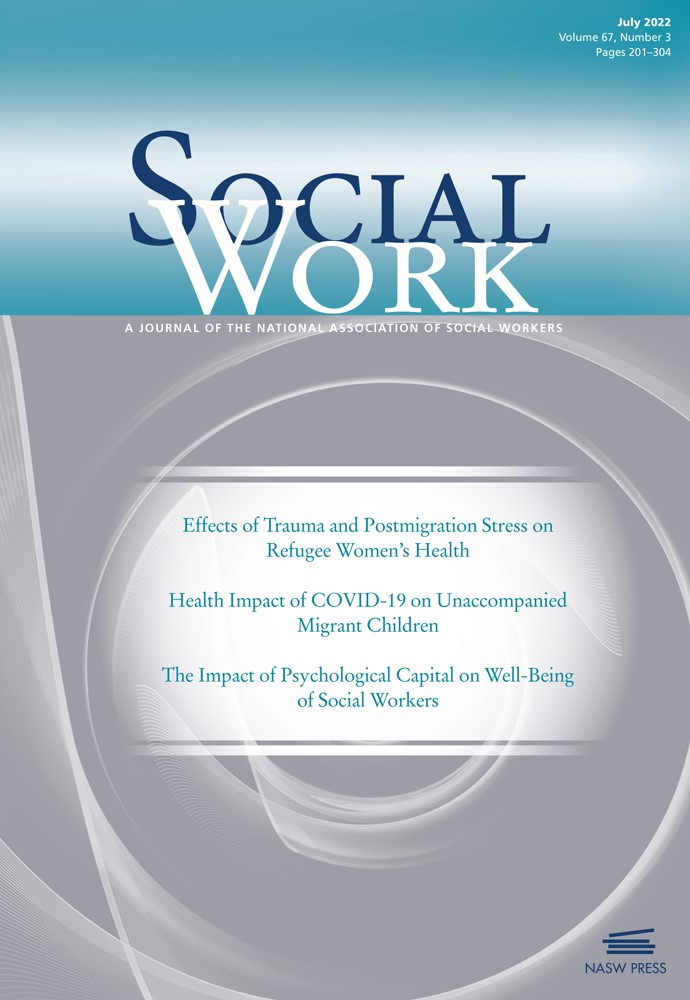NASW members can access the Social Work journal, published by NASW Press, online as a member benefit. The contents for the July 2022 issue include:
Editorial: Social Work’s Role in Rebuilding the Child Welfare Workforce
There has been a great deal of discussion in academia and the media about how the COVID-19 pandemic has impacted the workforce. Many question whether these changes are permanent shifts in who is working, how we work, and how we balance work and the rest of our lives. These are important conversations at all levels.
Effects of Trauma and Postmigration Stress on Refugee Women’s Health: A Life Course Perspective
Trauma exposure and postmigration stress are associated with adverse health outcomes among refugees, yet the relative effect of these factors for subgroups of refugees and those resettled long-term remains unclear. Drawing on life course theory, this study evaluated the associations between war trauma, postmigration stress, and health among Southeast Asian refugee women in the United States, and whether these patterns differ across the life span.
The COVID-19 Pandemic: Health Impact on Unaccompanied Migrant Children
From the point of apprehension by U.S. Customs and Border Protection at the U.S.–Mexican border to their reunification with sponsors in U.S. communities, unaccompanied children (UC) face political, social, and economic conditions, heightening their risk for mental and physical health burdens that may be exacerbated during the COVID-19 pandemic. Such risk underscores the importance of social work practice and advocacy for the improved treatment and experiences of UC.
The Impact of Psychological Capital on Well-Being of Social Workers: A Mixed-Methods Investigation
Social workers are often faced with long working hours, high job demands, and poor work–life balance, which can have detrimental effects on their well-being. It is therefore important to identify the protective factors that enable social workers to flourish and thrive. Psychological capital is conceptualized as a higher-order core construct that encompasses hope, efficacy, resilience, and optimism.
A U.S. Truth and Reconciliation Commission: Social Work’s Role in Racial Healing
A U.S. truth and reconciliation commission (TRC) can advance racial justice by acknowledging the historical trauma tied to the United States’ legacy of slavery and subsequent racism. This truth telling can facilitate a national reckoning with the past and set the stage for social transformation. This article aims to present insights into how such a U.S. TRC might work.
Professional Social Work and Public Libraries in the United States: A Scoping Review
This study aims to investigate how professional social work is practiced in U.S. public libraries using a scoping review method. Following Arksey and O’Malley’s framework for conducting a scoping review, the research team undertook a scoping review of academic literature, such as peer-reviewed studies, academic conference presentations, and dissertations/theses, as well as so-called gray literature, including news articles and web search results.
Finding Joy in Social Work: Practical Strategies
Based on the broaden-and-build theory of positive emotion, this article suggests that efforts by social workers to find joy in the profession may help them broaden their scope of attention, cognition, and action; build physical, intellectual, and social resources for future use; and increase resilience.
Striving for Organizational Impact through Individual Impact: A Humanistic Management Approach Involving Social Work Supervisors
In today’s era of new public management, respecting the dignity and worth of social workers in organizational management poses a challenge to social work agencies. This research explores whether individual self-actualization can be integrated with organizational development by using a humanistic management approach.
Social Work and Youth Participatory Action Research (YPAR): Past, Present, and Future
The social work profession has made tremendous contributions to youth well-being, laying the foundation for social welfare systems and child protection laws. However, deficit-based constructions of youth are deeply engrained in the profession. Social work researchers have called for attention to critical approaches like youth participatory action research.
This issue also contains practice updates, commentary, book reviews, and a letter to the editor. To sign in for the Journal on the web, please first go to the Social Work journal homepage. At the very top right, Click “Sign In.” At the top is “Oxford Academic account.” Instead, where it says NASW Press, click “Sign in via society site.” You will be taken to a sign-in page. Please enter your NASW username and password. Once signed in, click on the image of the journal Social Work, and then you can navigate to the issue and article of your choice.
The journal Social Work is a benefit of your membership. It is available online or, at your request, in print. Children & Schools, Health & Social Work and Social Work Research are available by subscription at a discounted rate for NASW members, either online or in print. You can find a link to the subscriptions on the NASW Press website.
We appreciate your membership! If you have any questions, please call NASW Member Services at 1-800-742-4089 Monday through Friday 9 a.m. to 9 p.m. ET.




